Evaluating Mental Health Programs for Indigenous Australians Health
VerifiedAdded on 2023/06/10
|9
|2864
|351
Report
AI Summary
This report examines the prevalence of mental health disorders among Aboriginal and Torres Strait Islander people, highlighting the significant impact on their overall well-being. It discusses the Aboriginal and Torres Strait Islander Mental Health Program, evaluating its strengths and limitations in providing culturally appropriate mental health services. The report also addresses potential barriers to accessing these services, such as lack of education, awareness, and healthcare access. Furthermore, it emphasizes the importance of developing culturally competent and culturally safe care plans that respect the cultural values and beliefs of Aboriginal and Torres Strait Islander people, ensuring patient consent, positive patient experiences, and improved mental health outcomes. The report concludes by underscoring the need for continued efforts to promote health through targeted programs and culturally sensitive care approaches to reduce the negative impact of mental health issues within these communities. Desklib provides access to similar solved assignments for students.
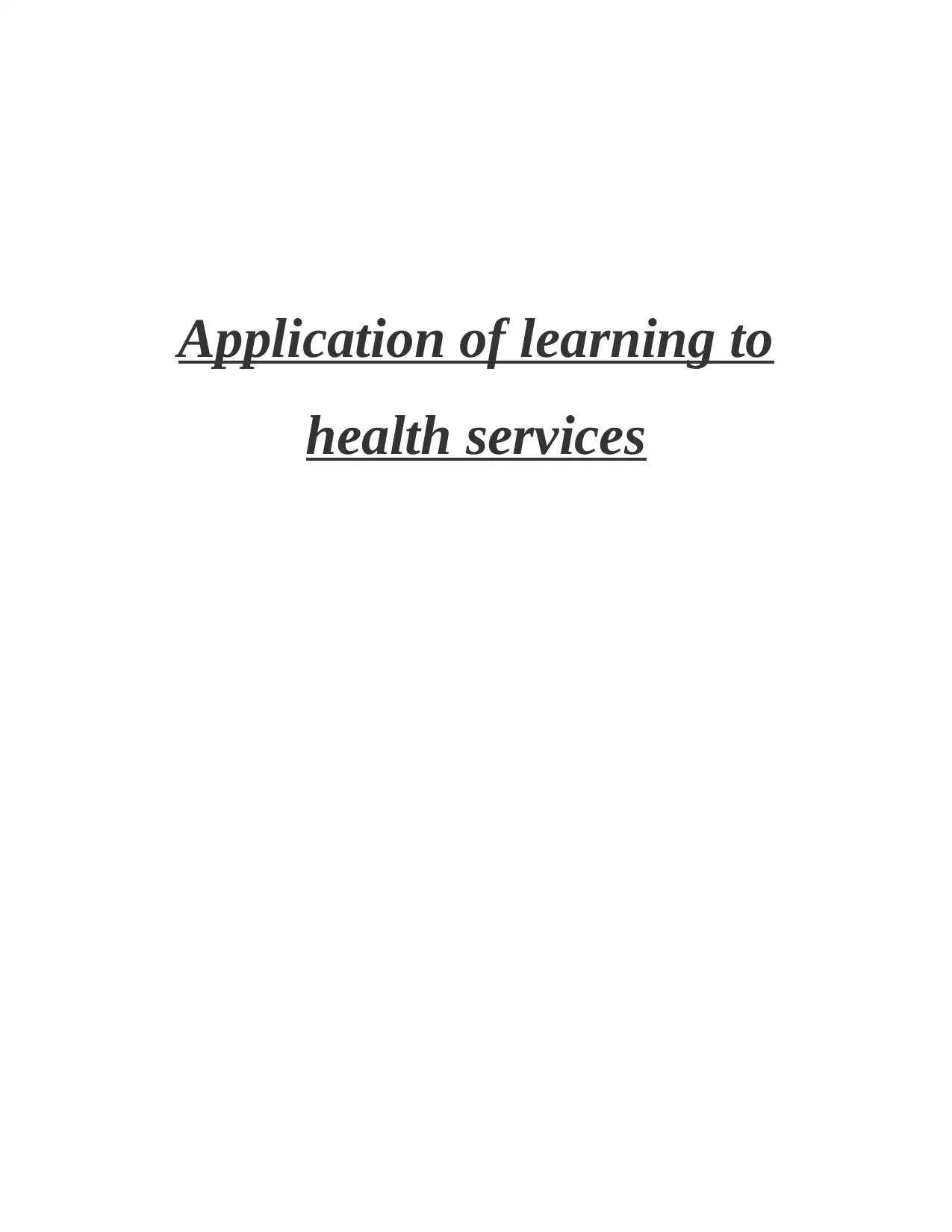
Application of learning to
health services
health services
Paraphrase This Document
Need a fresh take? Get an instant paraphrase of this document with our AI Paraphraser
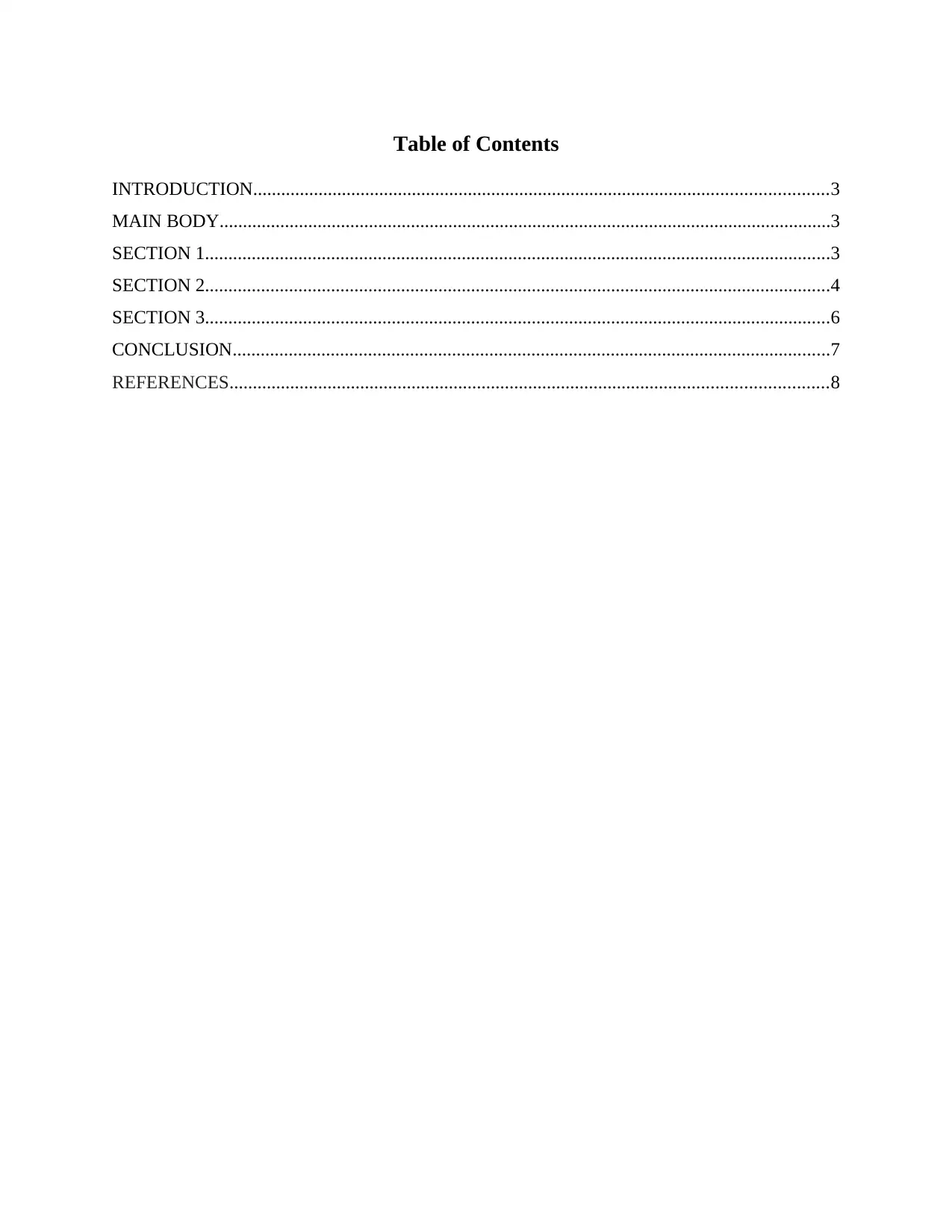
Table of Contents
INTRODUCTION...........................................................................................................................3
MAIN BODY...................................................................................................................................3
SECTION 1......................................................................................................................................3
SECTION 2......................................................................................................................................4
SECTION 3......................................................................................................................................6
CONCLUSION................................................................................................................................7
REFERENCES................................................................................................................................8
INTRODUCTION...........................................................................................................................3
MAIN BODY...................................................................................................................................3
SECTION 1......................................................................................................................................3
SECTION 2......................................................................................................................................4
SECTION 3......................................................................................................................................6
CONCLUSION................................................................................................................................7
REFERENCES................................................................................................................................8
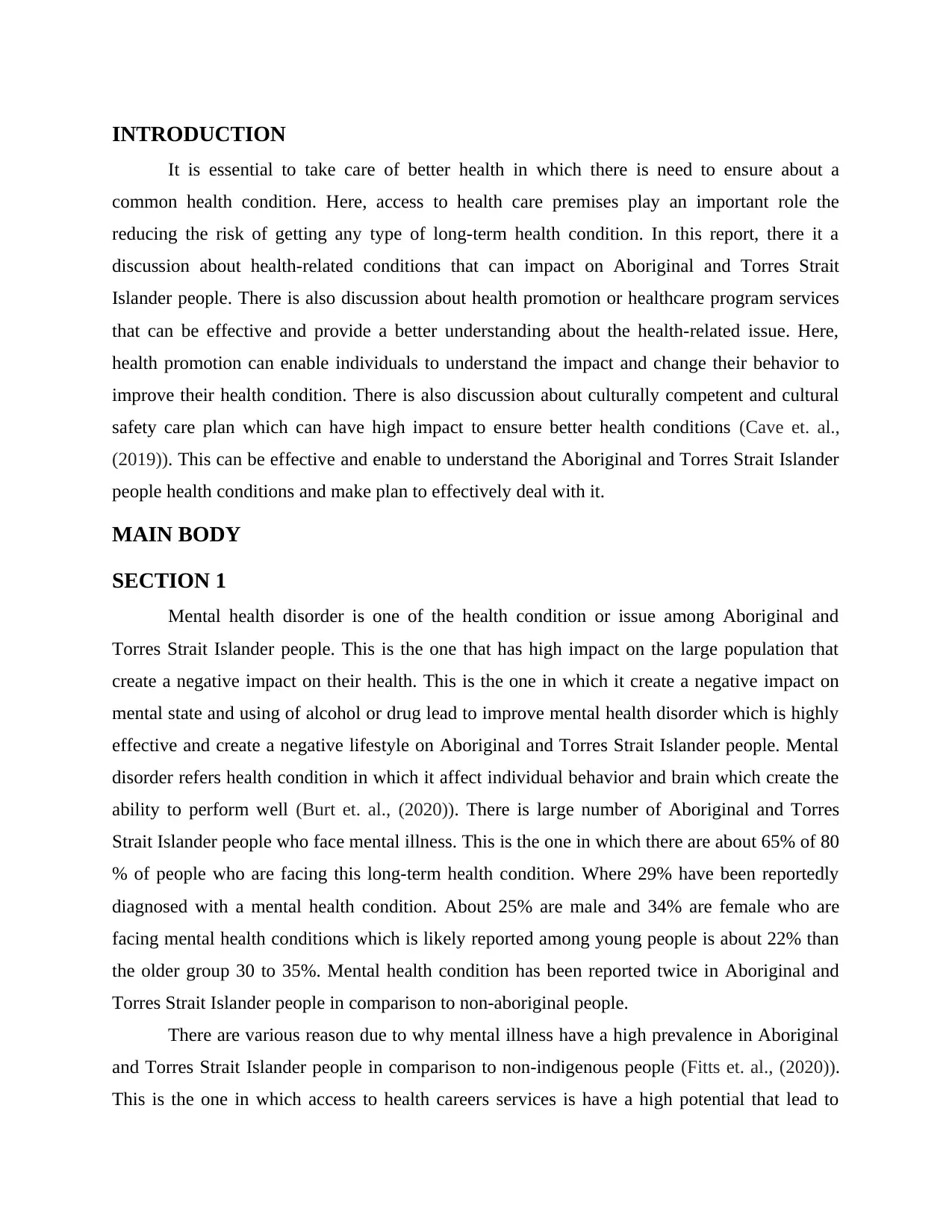
INTRODUCTION
It is essential to take care of better health in which there is need to ensure about a
common health condition. Here, access to health care premises play an important role the
reducing the risk of getting any type of long-term health condition. In this report, there it a
discussion about health-related conditions that can impact on Aboriginal and Torres Strait
Islander people. There is also discussion about health promotion or healthcare program services
that can be effective and provide a better understanding about the health-related issue. Here,
health promotion can enable individuals to understand the impact and change their behavior to
improve their health condition. There is also discussion about culturally competent and cultural
safety care plan which can have high impact to ensure better health conditions (Cave et. al.,
(2019)). This can be effective and enable to understand the Aboriginal and Torres Strait Islander
people health conditions and make plan to effectively deal with it.
MAIN BODY
SECTION 1
Mental health disorder is one of the health condition or issue among Aboriginal and
Torres Strait Islander people. This is the one that has high impact on the large population that
create a negative impact on their health. This is the one in which it create a negative impact on
mental state and using of alcohol or drug lead to improve mental health disorder which is highly
effective and create a negative lifestyle on Aboriginal and Torres Strait Islander people. Mental
disorder refers health condition in which it affect individual behavior and brain which create the
ability to perform well (Burt et. al., (2020)). There is large number of Aboriginal and Torres
Strait Islander people who face mental illness. This is the one in which there are about 65% of 80
% of people who are facing this long-term health condition. Where 29% have been reportedly
diagnosed with a mental health condition. About 25% are male and 34% are female who are
facing mental health conditions which is likely reported among young people is about 22% than
the older group 30 to 35%. Mental health condition has been reported twice in Aboriginal and
Torres Strait Islander people in comparison to non-aboriginal people.
There are various reason due to why mental illness have a high prevalence in Aboriginal
and Torres Strait Islander people in comparison to non-indigenous people (Fitts et. al., (2020)).
This is the one in which access to health careers services is have a high potential that lead to
It is essential to take care of better health in which there is need to ensure about a
common health condition. Here, access to health care premises play an important role the
reducing the risk of getting any type of long-term health condition. In this report, there it a
discussion about health-related conditions that can impact on Aboriginal and Torres Strait
Islander people. There is also discussion about health promotion or healthcare program services
that can be effective and provide a better understanding about the health-related issue. Here,
health promotion can enable individuals to understand the impact and change their behavior to
improve their health condition. There is also discussion about culturally competent and cultural
safety care plan which can have high impact to ensure better health conditions (Cave et. al.,
(2019)). This can be effective and enable to understand the Aboriginal and Torres Strait Islander
people health conditions and make plan to effectively deal with it.
MAIN BODY
SECTION 1
Mental health disorder is one of the health condition or issue among Aboriginal and
Torres Strait Islander people. This is the one that has high impact on the large population that
create a negative impact on their health. This is the one in which it create a negative impact on
mental state and using of alcohol or drug lead to improve mental health disorder which is highly
effective and create a negative lifestyle on Aboriginal and Torres Strait Islander people. Mental
disorder refers health condition in which it affect individual behavior and brain which create the
ability to perform well (Burt et. al., (2020)). There is large number of Aboriginal and Torres
Strait Islander people who face mental illness. This is the one in which there are about 65% of 80
% of people who are facing this long-term health condition. Where 29% have been reportedly
diagnosed with a mental health condition. About 25% are male and 34% are female who are
facing mental health conditions which is likely reported among young people is about 22% than
the older group 30 to 35%. Mental health condition has been reported twice in Aboriginal and
Torres Strait Islander people in comparison to non-aboriginal people.
There are various reason due to why mental illness have a high prevalence in Aboriginal
and Torres Strait Islander people in comparison to non-indigenous people (Fitts et. al., (2020)).
This is the one in which access to health careers services is have a high potential that lead to
⊘ This is a preview!⊘
Do you want full access?
Subscribe today to unlock all pages.

Trusted by 1+ million students worldwide
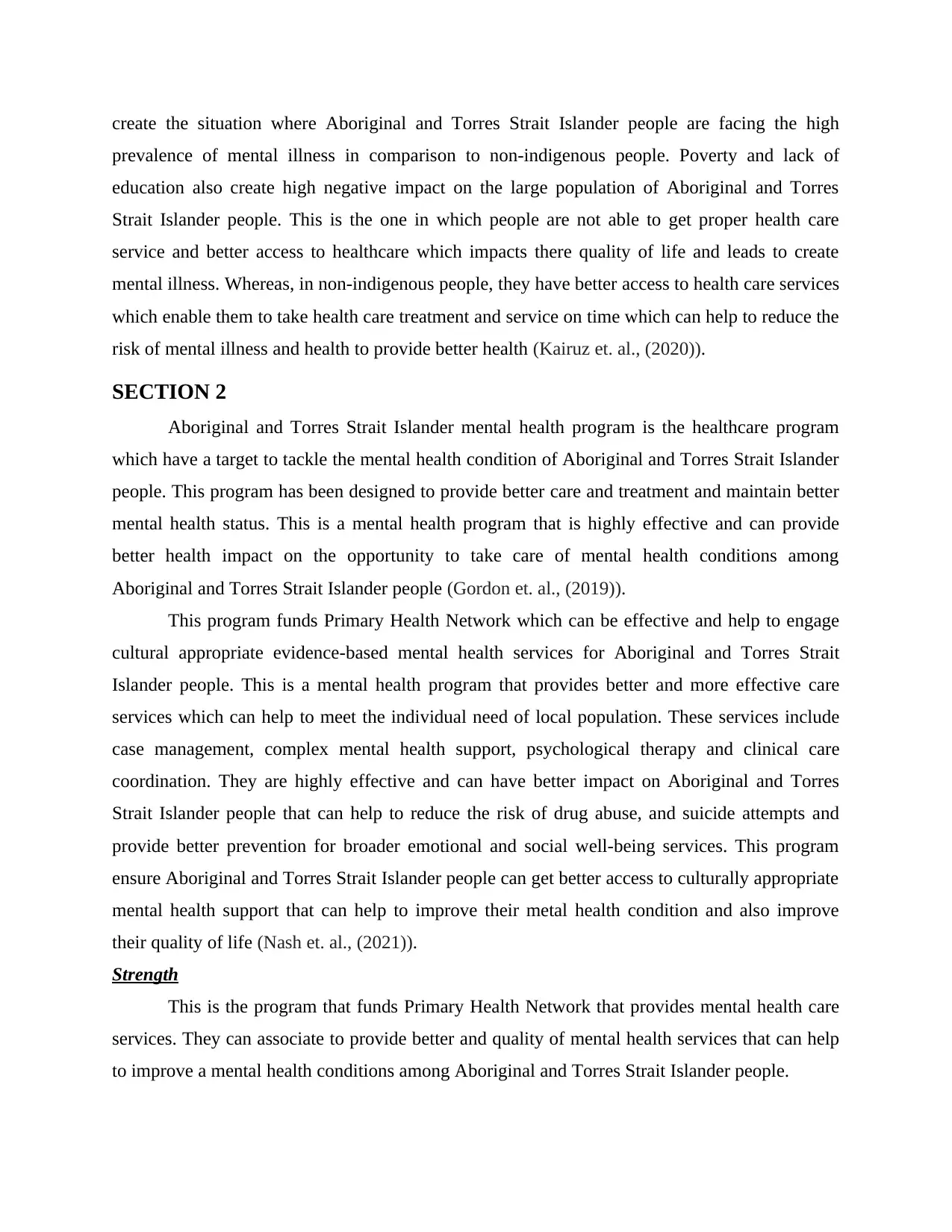
create the situation where Aboriginal and Torres Strait Islander people are facing the high
prevalence of mental illness in comparison to non-indigenous people. Poverty and lack of
education also create high negative impact on the large population of Aboriginal and Torres
Strait Islander people. This is the one in which people are not able to get proper health care
service and better access to healthcare which impacts there quality of life and leads to create
mental illness. Whereas, in non-indigenous people, they have better access to health care services
which enable them to take health care treatment and service on time which can help to reduce the
risk of mental illness and health to provide better health (Kairuz et. al., (2020)).
SECTION 2
Aboriginal and Torres Strait Islander mental health program is the healthcare program
which have a target to tackle the mental health condition of Aboriginal and Torres Strait Islander
people. This program has been designed to provide better care and treatment and maintain better
mental health status. This is a mental health program that is highly effective and can provide
better health impact on the opportunity to take care of mental health conditions among
Aboriginal and Torres Strait Islander people (Gordon et. al., (2019)).
This program funds Primary Health Network which can be effective and help to engage
cultural appropriate evidence-based mental health services for Aboriginal and Torres Strait
Islander people. This is a mental health program that provides better and more effective care
services which can help to meet the individual need of local population. These services include
case management, complex mental health support, psychological therapy and clinical care
coordination. They are highly effective and can have better impact on Aboriginal and Torres
Strait Islander people that can help to reduce the risk of drug abuse, and suicide attempts and
provide better prevention for broader emotional and social well-being services. This program
ensure Aboriginal and Torres Strait Islander people can get better access to culturally appropriate
mental health support that can help to improve their metal health condition and also improve
their quality of life (Nash et. al., (2021)).
Strength
This is the program that funds Primary Health Network that provides mental health care
services. They can associate to provide better and quality of mental health services that can help
to improve a mental health conditions among Aboriginal and Torres Strait Islander people.
prevalence of mental illness in comparison to non-indigenous people. Poverty and lack of
education also create high negative impact on the large population of Aboriginal and Torres
Strait Islander people. This is the one in which people are not able to get proper health care
service and better access to healthcare which impacts there quality of life and leads to create
mental illness. Whereas, in non-indigenous people, they have better access to health care services
which enable them to take health care treatment and service on time which can help to reduce the
risk of mental illness and health to provide better health (Kairuz et. al., (2020)).
SECTION 2
Aboriginal and Torres Strait Islander mental health program is the healthcare program
which have a target to tackle the mental health condition of Aboriginal and Torres Strait Islander
people. This program has been designed to provide better care and treatment and maintain better
mental health status. This is a mental health program that is highly effective and can provide
better health impact on the opportunity to take care of mental health conditions among
Aboriginal and Torres Strait Islander people (Gordon et. al., (2019)).
This program funds Primary Health Network which can be effective and help to engage
cultural appropriate evidence-based mental health services for Aboriginal and Torres Strait
Islander people. This is a mental health program that provides better and more effective care
services which can help to meet the individual need of local population. These services include
case management, complex mental health support, psychological therapy and clinical care
coordination. They are highly effective and can have better impact on Aboriginal and Torres
Strait Islander people that can help to reduce the risk of drug abuse, and suicide attempts and
provide better prevention for broader emotional and social well-being services. This program
ensure Aboriginal and Torres Strait Islander people can get better access to culturally appropriate
mental health support that can help to improve their metal health condition and also improve
their quality of life (Nash et. al., (2021)).
Strength
This is the program that funds Primary Health Network that provides mental health care
services. They can associate to provide better and quality of mental health services that can help
to improve a mental health conditions among Aboriginal and Torres Strait Islander people.
Paraphrase This Document
Need a fresh take? Get an instant paraphrase of this document with our AI Paraphraser
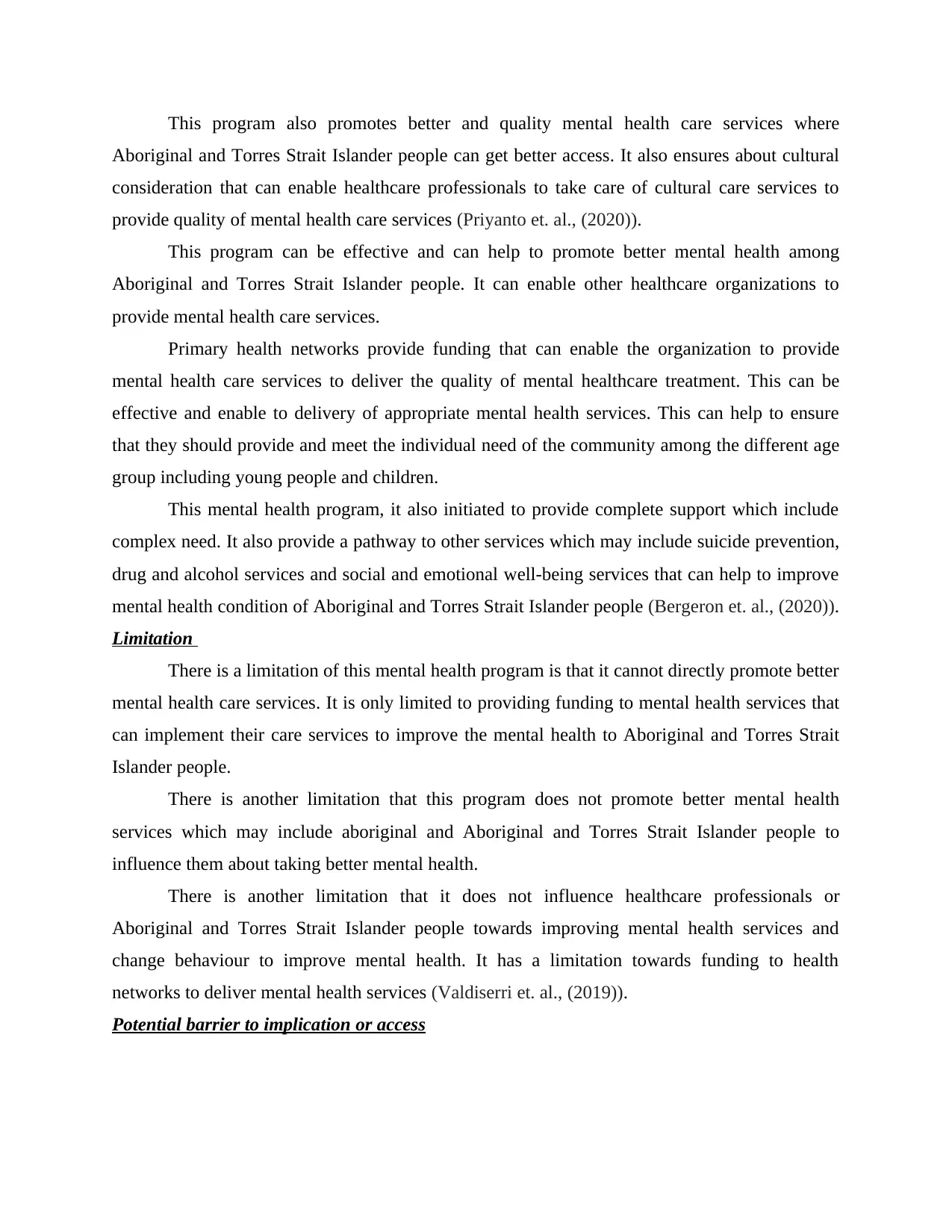
This program also promotes better and quality mental health care services where
Aboriginal and Torres Strait Islander people can get better access. It also ensures about cultural
consideration that can enable healthcare professionals to take care of cultural care services to
provide quality of mental health care services (Priyanto et. al., (2020)).
This program can be effective and can help to promote better mental health among
Aboriginal and Torres Strait Islander people. It can enable other healthcare organizations to
provide mental health care services.
Primary health networks provide funding that can enable the organization to provide
mental health care services to deliver the quality of mental healthcare treatment. This can be
effective and enable to delivery of appropriate mental health services. This can help to ensure
that they should provide and meet the individual need of the community among the different age
group including young people and children.
This mental health program, it also initiated to provide complete support which include
complex need. It also provide a pathway to other services which may include suicide prevention,
drug and alcohol services and social and emotional well-being services that can help to improve
mental health condition of Aboriginal and Torres Strait Islander people (Bergeron et. al., (2020)).
Limitation
There is a limitation of this mental health program is that it cannot directly promote better
mental health care services. It is only limited to providing funding to mental health services that
can implement their care services to improve the mental health to Aboriginal and Torres Strait
Islander people.
There is another limitation that this program does not promote better mental health
services which may include aboriginal and Aboriginal and Torres Strait Islander people to
influence them about taking better mental health.
There is another limitation that it does not influence healthcare professionals or
Aboriginal and Torres Strait Islander people towards improving mental health services and
change behaviour to improve mental health. It has a limitation towards funding to health
networks to deliver mental health services (Valdiserri et. al., (2019)).
Potential barrier to implication or access
Aboriginal and Torres Strait Islander people can get better access. It also ensures about cultural
consideration that can enable healthcare professionals to take care of cultural care services to
provide quality of mental health care services (Priyanto et. al., (2020)).
This program can be effective and can help to promote better mental health among
Aboriginal and Torres Strait Islander people. It can enable other healthcare organizations to
provide mental health care services.
Primary health networks provide funding that can enable the organization to provide
mental health care services to deliver the quality of mental healthcare treatment. This can be
effective and enable to delivery of appropriate mental health services. This can help to ensure
that they should provide and meet the individual need of the community among the different age
group including young people and children.
This mental health program, it also initiated to provide complete support which include
complex need. It also provide a pathway to other services which may include suicide prevention,
drug and alcohol services and social and emotional well-being services that can help to improve
mental health condition of Aboriginal and Torres Strait Islander people (Bergeron et. al., (2020)).
Limitation
There is a limitation of this mental health program is that it cannot directly promote better
mental health care services. It is only limited to providing funding to mental health services that
can implement their care services to improve the mental health to Aboriginal and Torres Strait
Islander people.
There is another limitation that this program does not promote better mental health
services which may include aboriginal and Aboriginal and Torres Strait Islander people to
influence them about taking better mental health.
There is another limitation that it does not influence healthcare professionals or
Aboriginal and Torres Strait Islander people towards improving mental health services and
change behaviour to improve mental health. It has a limitation towards funding to health
networks to deliver mental health services (Valdiserri et. al., (2019)).
Potential barrier to implication or access
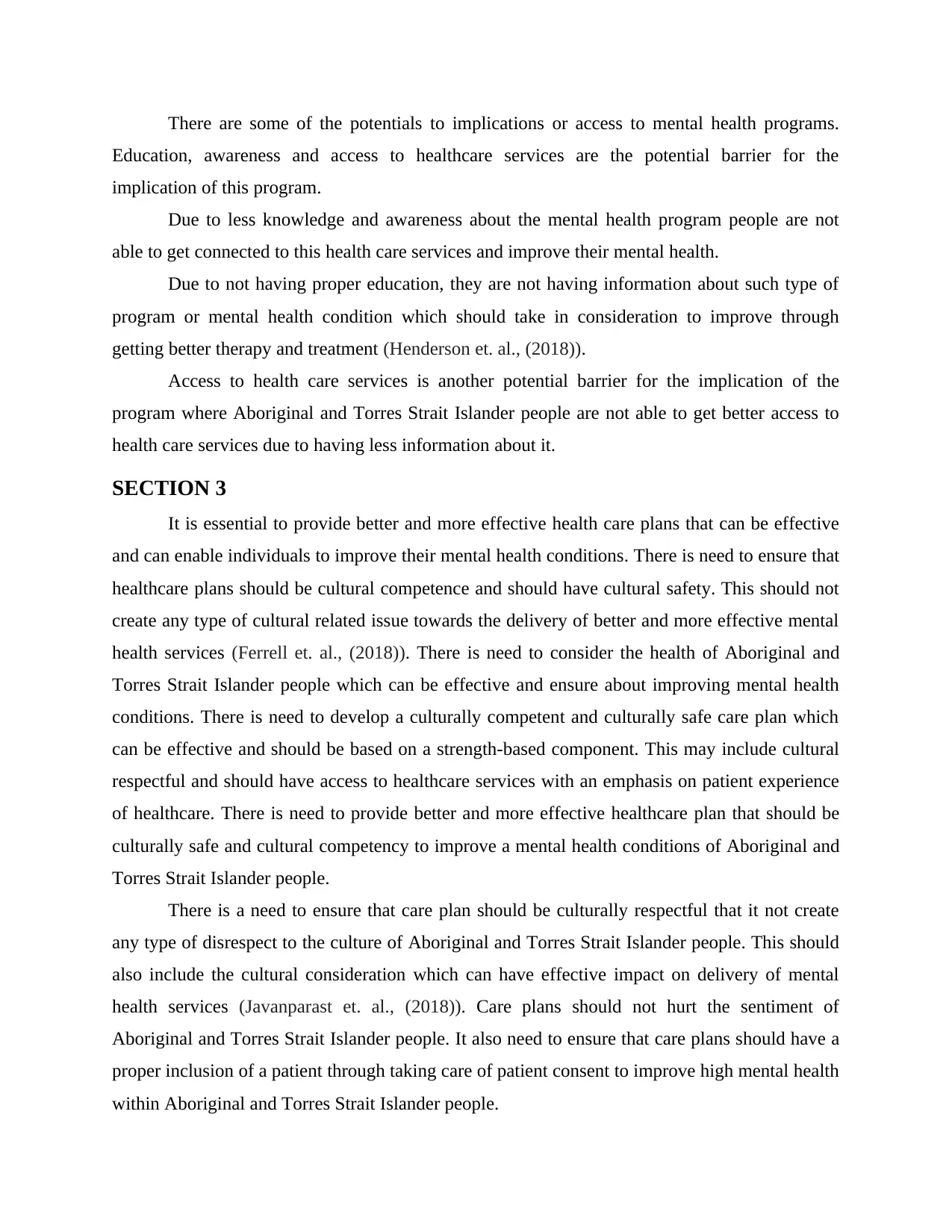
There are some of the potentials to implications or access to mental health programs.
Education, awareness and access to healthcare services are the potential barrier for the
implication of this program.
Due to less knowledge and awareness about the mental health program people are not
able to get connected to this health care services and improve their mental health.
Due to not having proper education, they are not having information about such type of
program or mental health condition which should take in consideration to improve through
getting better therapy and treatment (Henderson et. al., (2018)).
Access to health care services is another potential barrier for the implication of the
program where Aboriginal and Torres Strait Islander people are not able to get better access to
health care services due to having less information about it.
SECTION 3
It is essential to provide better and more effective health care plans that can be effective
and can enable individuals to improve their mental health conditions. There is need to ensure that
healthcare plans should be cultural competence and should have cultural safety. This should not
create any type of cultural related issue towards the delivery of better and more effective mental
health services (Ferrell et. al., (2018)). There is need to consider the health of Aboriginal and
Torres Strait Islander people which can be effective and ensure about improving mental health
conditions. There is need to develop a culturally competent and culturally safe care plan which
can be effective and should be based on a strength-based component. This may include cultural
respectful and should have access to healthcare services with an emphasis on patient experience
of healthcare. There is need to provide better and more effective healthcare plan that should be
culturally safe and cultural competency to improve a mental health conditions of Aboriginal and
Torres Strait Islander people.
There is a need to ensure that care plan should be culturally respectful that it not create
any type of disrespect to the culture of Aboriginal and Torres Strait Islander people. This should
also include the cultural consideration which can have effective impact on delivery of mental
health services (Javanparast et. al., (2018)). Care plans should not hurt the sentiment of
Aboriginal and Torres Strait Islander people. It also need to ensure that care plans should have a
proper inclusion of a patient through taking care of patient consent to improve high mental health
within Aboriginal and Torres Strait Islander people.
Education, awareness and access to healthcare services are the potential barrier for the
implication of this program.
Due to less knowledge and awareness about the mental health program people are not
able to get connected to this health care services and improve their mental health.
Due to not having proper education, they are not having information about such type of
program or mental health condition which should take in consideration to improve through
getting better therapy and treatment (Henderson et. al., (2018)).
Access to health care services is another potential barrier for the implication of the
program where Aboriginal and Torres Strait Islander people are not able to get better access to
health care services due to having less information about it.
SECTION 3
It is essential to provide better and more effective health care plans that can be effective
and can enable individuals to improve their mental health conditions. There is need to ensure that
healthcare plans should be cultural competence and should have cultural safety. This should not
create any type of cultural related issue towards the delivery of better and more effective mental
health services (Ferrell et. al., (2018)). There is need to consider the health of Aboriginal and
Torres Strait Islander people which can be effective and ensure about improving mental health
conditions. There is need to develop a culturally competent and culturally safe care plan which
can be effective and should be based on a strength-based component. This may include cultural
respectful and should have access to healthcare services with an emphasis on patient experience
of healthcare. There is need to provide better and more effective healthcare plan that should be
culturally safe and cultural competency to improve a mental health conditions of Aboriginal and
Torres Strait Islander people.
There is a need to ensure that care plan should be culturally respectful that it not create
any type of disrespect to the culture of Aboriginal and Torres Strait Islander people. This should
also include the cultural consideration which can have effective impact on delivery of mental
health services (Javanparast et. al., (2018)). Care plans should not hurt the sentiment of
Aboriginal and Torres Strait Islander people. It also need to ensure that care plans should have a
proper inclusion of a patient through taking care of patient consent to improve high mental health
within Aboriginal and Torres Strait Islander people.
⊘ This is a preview!⊘
Do you want full access?
Subscribe today to unlock all pages.

Trusted by 1+ million students worldwide
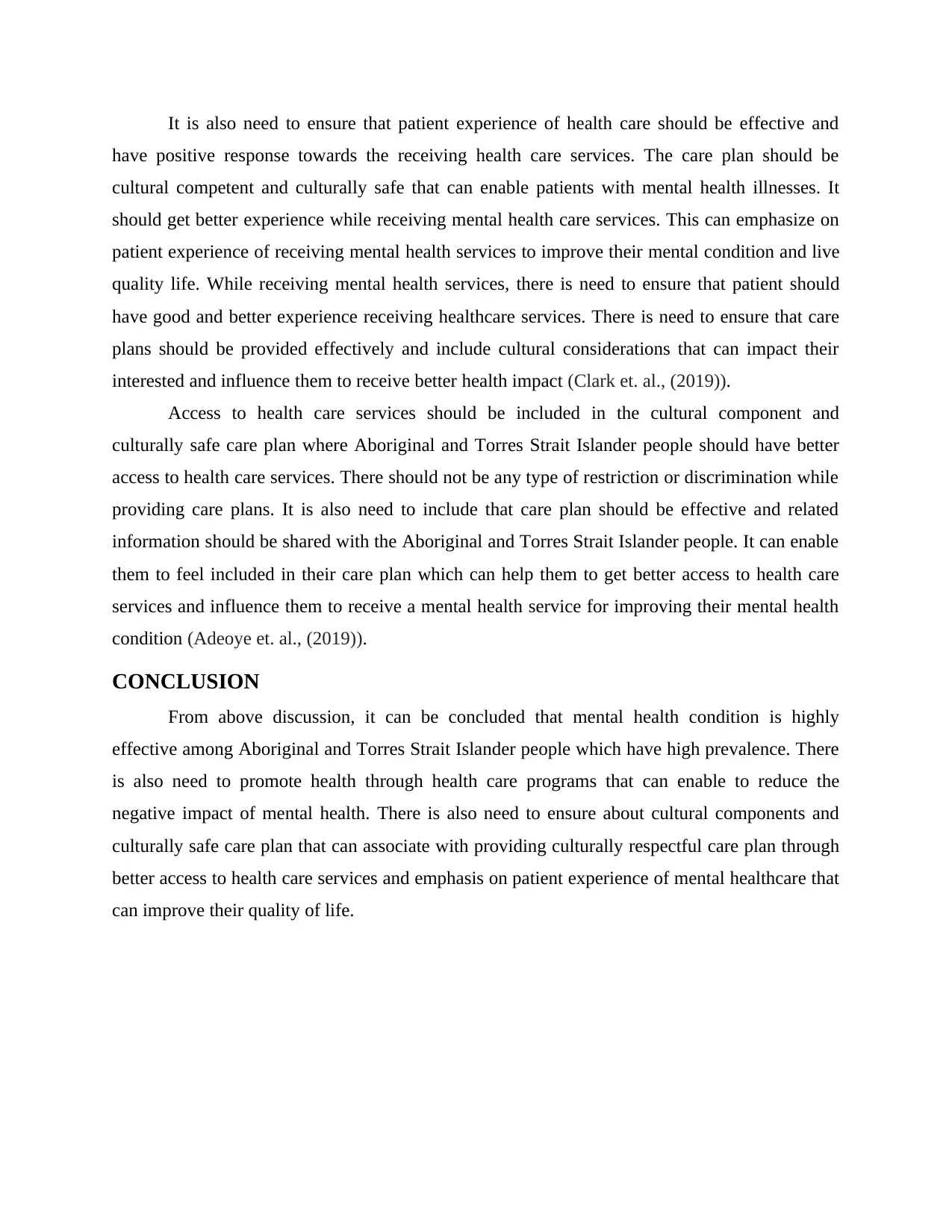
It is also need to ensure that patient experience of health care should be effective and
have positive response towards the receiving health care services. The care plan should be
cultural competent and culturally safe that can enable patients with mental health illnesses. It
should get better experience while receiving mental health care services. This can emphasize on
patient experience of receiving mental health services to improve their mental condition and live
quality life. While receiving mental health services, there is need to ensure that patient should
have good and better experience receiving healthcare services. There is need to ensure that care
plans should be provided effectively and include cultural considerations that can impact their
interested and influence them to receive better health impact (Clark et. al., (2019)).
Access to health care services should be included in the cultural component and
culturally safe care plan where Aboriginal and Torres Strait Islander people should have better
access to health care services. There should not be any type of restriction or discrimination while
providing care plans. It is also need to include that care plan should be effective and related
information should be shared with the Aboriginal and Torres Strait Islander people. It can enable
them to feel included in their care plan which can help them to get better access to health care
services and influence them to receive a mental health service for improving their mental health
condition (Adeoye et. al., (2019)).
CONCLUSION
From above discussion, it can be concluded that mental health condition is highly
effective among Aboriginal and Torres Strait Islander people which have high prevalence. There
is also need to promote health through health care programs that can enable to reduce the
negative impact of mental health. There is also need to ensure about cultural components and
culturally safe care plan that can associate with providing culturally respectful care plan through
better access to health care services and emphasis on patient experience of mental healthcare that
can improve their quality of life.
have positive response towards the receiving health care services. The care plan should be
cultural competent and culturally safe that can enable patients with mental health illnesses. It
should get better experience while receiving mental health care services. This can emphasize on
patient experience of receiving mental health services to improve their mental condition and live
quality life. While receiving mental health services, there is need to ensure that patient should
have good and better experience receiving healthcare services. There is need to ensure that care
plans should be provided effectively and include cultural considerations that can impact their
interested and influence them to receive better health impact (Clark et. al., (2019)).
Access to health care services should be included in the cultural component and
culturally safe care plan where Aboriginal and Torres Strait Islander people should have better
access to health care services. There should not be any type of restriction or discrimination while
providing care plans. It is also need to include that care plan should be effective and related
information should be shared with the Aboriginal and Torres Strait Islander people. It can enable
them to feel included in their care plan which can help them to get better access to health care
services and influence them to receive a mental health service for improving their mental health
condition (Adeoye et. al., (2019)).
CONCLUSION
From above discussion, it can be concluded that mental health condition is highly
effective among Aboriginal and Torres Strait Islander people which have high prevalence. There
is also need to promote health through health care programs that can enable to reduce the
negative impact of mental health. There is also need to ensure about cultural components and
culturally safe care plan that can associate with providing culturally respectful care plan through
better access to health care services and emphasis on patient experience of mental healthcare that
can improve their quality of life.
Paraphrase This Document
Need a fresh take? Get an instant paraphrase of this document with our AI Paraphraser
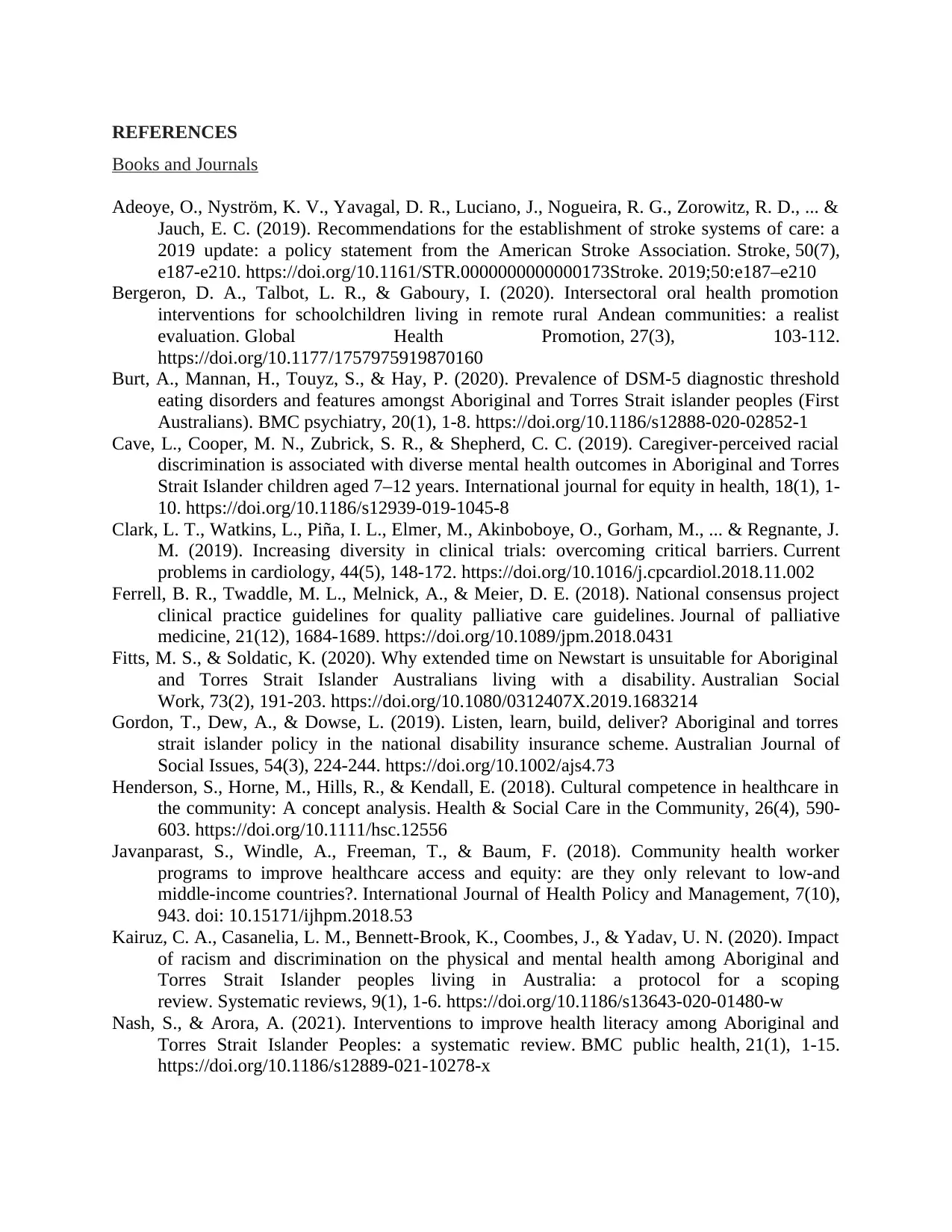
REFERENCES
Books and Journals
Adeoye, O., Nyström, K. V., Yavagal, D. R., Luciano, J., Nogueira, R. G., Zorowitz, R. D., ... &
Jauch, E. C. (2019). Recommendations for the establishment of stroke systems of care: a
2019 update: a policy statement from the American Stroke Association. Stroke, 50(7),
e187-e210. https://doi.org/10.1161/STR.0000000000000173Stroke. 2019;50:e187–e210
Bergeron, D. A., Talbot, L. R., & Gaboury, I. (2020). Intersectoral oral health promotion
interventions for schoolchildren living in remote rural Andean communities: a realist
evaluation. Global Health Promotion, 27(3), 103-112.
https://doi.org/10.1177/1757975919870160
Burt, A., Mannan, H., Touyz, S., & Hay, P. (2020). Prevalence of DSM-5 diagnostic threshold
eating disorders and features amongst Aboriginal and Torres Strait islander peoples (First
Australians). BMC psychiatry, 20(1), 1-8. https://doi.org/10.1186/s12888-020-02852-1
Cave, L., Cooper, M. N., Zubrick, S. R., & Shepherd, C. C. (2019). Caregiver-perceived racial
discrimination is associated with diverse mental health outcomes in Aboriginal and Torres
Strait Islander children aged 7–12 years. International journal for equity in health, 18(1), 1-
10. https://doi.org/10.1186/s12939-019-1045-8
Clark, L. T., Watkins, L., Piña, I. L., Elmer, M., Akinboboye, O., Gorham, M., ... & Regnante, J.
M. (2019). Increasing diversity in clinical trials: overcoming critical barriers. Current
problems in cardiology, 44(5), 148-172. https://doi.org/10.1016/j.cpcardiol.2018.11.002
Ferrell, B. R., Twaddle, M. L., Melnick, A., & Meier, D. E. (2018). National consensus project
clinical practice guidelines for quality palliative care guidelines. Journal of palliative
medicine, 21(12), 1684-1689. https://doi.org/10.1089/jpm.2018.0431
Fitts, M. S., & Soldatic, K. (2020). Why extended time on Newstart is unsuitable for Aboriginal
and Torres Strait Islander Australians living with a disability. Australian Social
Work, 73(2), 191-203. https://doi.org/10.1080/0312407X.2019.1683214
Gordon, T., Dew, A., & Dowse, L. (2019). Listen, learn, build, deliver? Aboriginal and torres
strait islander policy in the national disability insurance scheme. Australian Journal of
Social Issues, 54(3), 224-244. https://doi.org/10.1002/ajs4.73
Henderson, S., Horne, M., Hills, R., & Kendall, E. (2018). Cultural competence in healthcare in
the community: A concept analysis. Health & Social Care in the Community, 26(4), 590-
603. https://doi.org/10.1111/hsc.12556
Javanparast, S., Windle, A., Freeman, T., & Baum, F. (2018). Community health worker
programs to improve healthcare access and equity: are they only relevant to low-and
middle-income countries?. International Journal of Health Policy and Management, 7(10),
943. doi: 10.15171/ijhpm.2018.53
Kairuz, C. A., Casanelia, L. M., Bennett-Brook, K., Coombes, J., & Yadav, U. N. (2020). Impact
of racism and discrimination on the physical and mental health among Aboriginal and
Torres Strait Islander peoples living in Australia: a protocol for a scoping
review. Systematic reviews, 9(1), 1-6. https://doi.org/10.1186/s13643-020-01480-w
Nash, S., & Arora, A. (2021). Interventions to improve health literacy among Aboriginal and
Torres Strait Islander Peoples: a systematic review. BMC public health, 21(1), 1-15.
https://doi.org/10.1186/s12889-021-10278-x
Books and Journals
Adeoye, O., Nyström, K. V., Yavagal, D. R., Luciano, J., Nogueira, R. G., Zorowitz, R. D., ... &
Jauch, E. C. (2019). Recommendations for the establishment of stroke systems of care: a
2019 update: a policy statement from the American Stroke Association. Stroke, 50(7),
e187-e210. https://doi.org/10.1161/STR.0000000000000173Stroke. 2019;50:e187–e210
Bergeron, D. A., Talbot, L. R., & Gaboury, I. (2020). Intersectoral oral health promotion
interventions for schoolchildren living in remote rural Andean communities: a realist
evaluation. Global Health Promotion, 27(3), 103-112.
https://doi.org/10.1177/1757975919870160
Burt, A., Mannan, H., Touyz, S., & Hay, P. (2020). Prevalence of DSM-5 diagnostic threshold
eating disorders and features amongst Aboriginal and Torres Strait islander peoples (First
Australians). BMC psychiatry, 20(1), 1-8. https://doi.org/10.1186/s12888-020-02852-1
Cave, L., Cooper, M. N., Zubrick, S. R., & Shepherd, C. C. (2019). Caregiver-perceived racial
discrimination is associated with diverse mental health outcomes in Aboriginal and Torres
Strait Islander children aged 7–12 years. International journal for equity in health, 18(1), 1-
10. https://doi.org/10.1186/s12939-019-1045-8
Clark, L. T., Watkins, L., Piña, I. L., Elmer, M., Akinboboye, O., Gorham, M., ... & Regnante, J.
M. (2019). Increasing diversity in clinical trials: overcoming critical barriers. Current
problems in cardiology, 44(5), 148-172. https://doi.org/10.1016/j.cpcardiol.2018.11.002
Ferrell, B. R., Twaddle, M. L., Melnick, A., & Meier, D. E. (2018). National consensus project
clinical practice guidelines for quality palliative care guidelines. Journal of palliative
medicine, 21(12), 1684-1689. https://doi.org/10.1089/jpm.2018.0431
Fitts, M. S., & Soldatic, K. (2020). Why extended time on Newstart is unsuitable for Aboriginal
and Torres Strait Islander Australians living with a disability. Australian Social
Work, 73(2), 191-203. https://doi.org/10.1080/0312407X.2019.1683214
Gordon, T., Dew, A., & Dowse, L. (2019). Listen, learn, build, deliver? Aboriginal and torres
strait islander policy in the national disability insurance scheme. Australian Journal of
Social Issues, 54(3), 224-244. https://doi.org/10.1002/ajs4.73
Henderson, S., Horne, M., Hills, R., & Kendall, E. (2018). Cultural competence in healthcare in
the community: A concept analysis. Health & Social Care in the Community, 26(4), 590-
603. https://doi.org/10.1111/hsc.12556
Javanparast, S., Windle, A., Freeman, T., & Baum, F. (2018). Community health worker
programs to improve healthcare access and equity: are they only relevant to low-and
middle-income countries?. International Journal of Health Policy and Management, 7(10),
943. doi: 10.15171/ijhpm.2018.53
Kairuz, C. A., Casanelia, L. M., Bennett-Brook, K., Coombes, J., & Yadav, U. N. (2020). Impact
of racism and discrimination on the physical and mental health among Aboriginal and
Torres Strait Islander peoples living in Australia: a protocol for a scoping
review. Systematic reviews, 9(1), 1-6. https://doi.org/10.1186/s13643-020-01480-w
Nash, S., & Arora, A. (2021). Interventions to improve health literacy among Aboriginal and
Torres Strait Islander Peoples: a systematic review. BMC public health, 21(1), 1-15.
https://doi.org/10.1186/s12889-021-10278-x
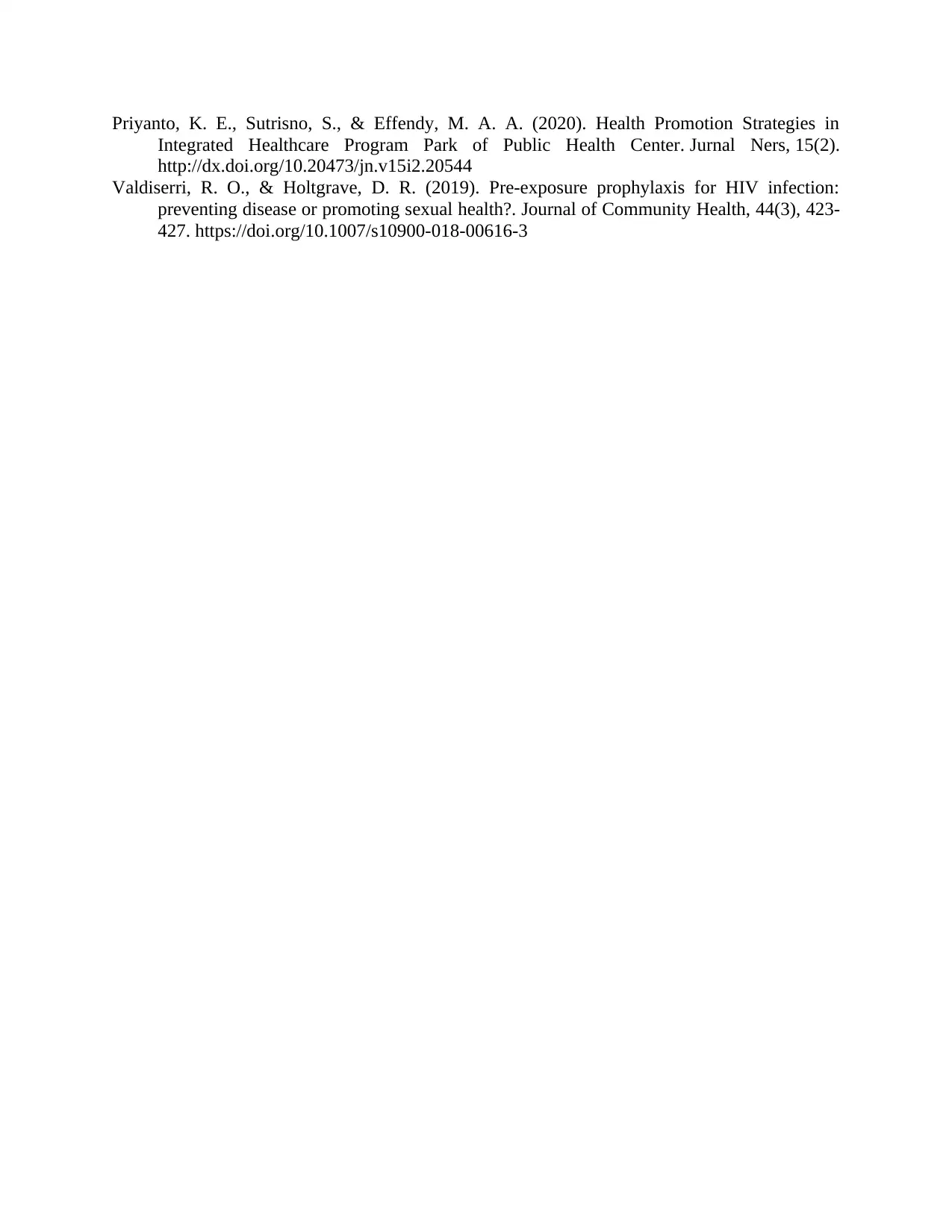
Priyanto, K. E., Sutrisno, S., & Effendy, M. A. A. (2020). Health Promotion Strategies in
Integrated Healthcare Program Park of Public Health Center. Jurnal Ners, 15(2).
http://dx.doi.org/10.20473/jn.v15i2.20544
Valdiserri, R. O., & Holtgrave, D. R. (2019). Pre-exposure prophylaxis for HIV infection:
preventing disease or promoting sexual health?. Journal of Community Health, 44(3), 423-
427. https://doi.org/10.1007/s10900-018-00616-3
Integrated Healthcare Program Park of Public Health Center. Jurnal Ners, 15(2).
http://dx.doi.org/10.20473/jn.v15i2.20544
Valdiserri, R. O., & Holtgrave, D. R. (2019). Pre-exposure prophylaxis for HIV infection:
preventing disease or promoting sexual health?. Journal of Community Health, 44(3), 423-
427. https://doi.org/10.1007/s10900-018-00616-3
⊘ This is a preview!⊘
Do you want full access?
Subscribe today to unlock all pages.

Trusted by 1+ million students worldwide
1 out of 9
Related Documents
Your All-in-One AI-Powered Toolkit for Academic Success.
+13062052269
info@desklib.com
Available 24*7 on WhatsApp / Email
![[object Object]](/_next/static/media/star-bottom.7253800d.svg)
Unlock your academic potential
Copyright © 2020–2026 A2Z Services. All Rights Reserved. Developed and managed by ZUCOL.





